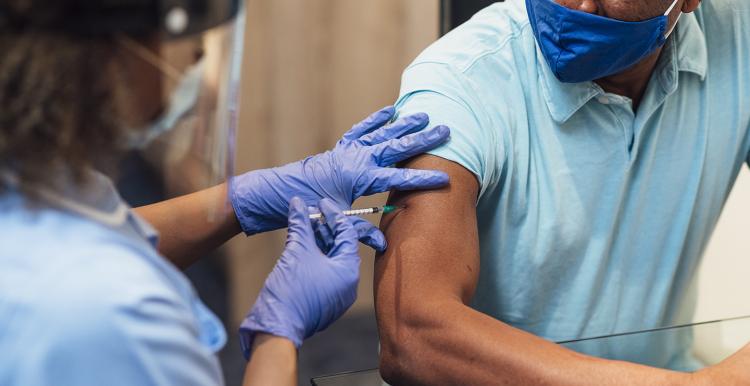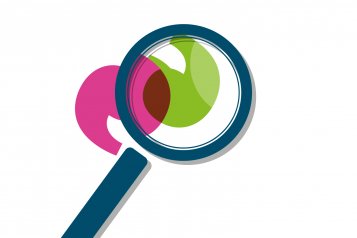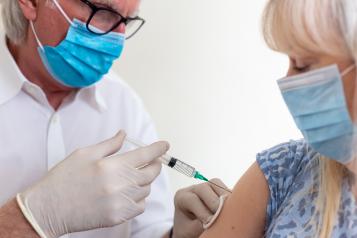COVID-19 vaccine: what you need to know

This article was last updated on 28 January 2022. For the latest information on COVID-19 visit the North Central London NHS website.
Who can get the COVID-19 vaccine?
If you are aged 16 and over, you can get a 1st and 2nd dose of a COVID-19 vaccine. This age group is now also eligible for their booster vaccine.
Children and young people aged 12 to 15 are now being offered two doses to give them the best protection against COVID-19.
If you are aged 16 or over
All those aged 16 or over can book their vaccination through the NHS booking service. You can also call 119 free of charge, anytime between 7am and 11pm seven days a week.
You can also find a walk-in COVID-19 vaccination site to get vaccinated without needing an appointment. Or you can wait to be contacted by your GP and book your appointment with them.
If you are aged 12 to 15
All children aged 12 to 15 will be offered the COVID-19 vaccine. Children can get a first dose of the vaccine from the day they turn 12. They can now get a second dose 12 weeks after their first dose.
You can get your vaccine at school, you can book a vaccination appointment online or you can find a walk-in vaccination site to get a vaccine without needing an appointment.
Second doses of the vaccine will be offered in schools from 10 January 2022.
Children will be offered the Pfizer/BioNTech vaccine. Most vaccinations will be delivered through a school-based vaccination programme, the same as for HPV and Diphtheria, Tetanus and Polio.
If you receive home schooling, are in secure services, or specialist mental health settings, then provision will be put in place to ensure you are still offered one dose of the vaccine.
Parental, guardian or carer consent will be sought before vaccinations are given in line with existing school vaccination programme policies.
How long between my first and second dose of the vaccine?
You will usually receive your second dose up to 8-12 weeks after the first, regardless of the vaccine type. The second dose completes the course and is important for longer term protection.
How do I book my second dose of the vaccine?
You'll need to book a 2nd dose for 8 to 12 weeks after your 1st dose.
- If you book online, you'll be asked to book appointments for both doses. You can manage your COVID-19 vaccination appointments to view your appointments and rebook if you need to.
- If you have your 1st dose at a walk-in vaccination site, you can book your 2nd COVID-19 vaccination appointment online. You'll need to wait 24 hours after your 1st dose before you can book.
- If you have your 1st dose through your GP surgery, you'll be contacted when it's time to book your 2nd dose.
Will I be offered a third dose?
People aged 12 years or older who had a severely weakened immune system at the time they had their second dose of the COVID-19 vaccine may be offered a third vaccine dose. This is different to the booster shots being offered.
This is because you may not have responded as well as other people and a third dose may help to improve your immune response and give you better protection.
People who may be offered a third dose include those who had or have:
- blood cancers (such as leukaemia or lymphoma)
- lowered immunity due to treatment (such as steroid medication, biological therapy, chemotherapy or radiotherapy)
- lowered immunity due to inherited disorders of the immune system
- an organ or bone marrow transplant
- diseases that affect the immune system such as poorly controlled HIV
- other diseases or treatments as advised by your specialist
Your GP will be in contact with your specialist and the NHS will let you know if you need a third dose and when and where to have the vaccine. Government guidance is available if you have further questions.
Will I be offered a booster shot?
To maintain high levels of protection throughout the winter months, the Government is offering a booster vaccine to help stop the spread of COVID-19.
Your appointment should be at least 3 months from your last dose, but you may be called later depending on your age group.
People aged 16 years and over will be offered a COVID-19 booster vaccine. You can book online or call 119 to make an appointment to have your booster.
How and when to get your COVID-19 booster vaccine?
You will be offered the booster at least three months after your second dose.
Most people will be invited to book an appointment at a larger vaccination centre, pharmacy, or local NHS service such as a GP surgery.
Your GP practice will contact you when you are eligible for your booster shot. Please do not contact them first.
What should I expect on the day?
You should arrive at the vaccination centre/ GP practice a few minutes before your appointment time and not any earlier. This is to ensure that the site can maintain social distancing in the waiting areas. You will also be required to wear a face-covering (if you can) and to sanitise your hands on arrival. There will be spare face masks if you forget your own and plenty of sanitiser for you to use whenever you need to. You may be asked to wait for 15 minutes after the vaccination.
Please do not be late. This is essential to maintain safe social distancing at the centres.
The vaccine is free, you will not be charged for your vaccinations.
What if I can’t get there on my own?
If you are housebound a home visit will be arranged for your appointments via your GP.
If you are not housebound but need support attending the appointment due to health and/or disability issues, a taxi transfer service is available from Age UK Islington. A carer, family member, or friend who could support your access to the vaccination site may accompany you in the taxi. You must be referred to this scheme by your GP practice. (Patients who have access to the taxi card scheme or other forms of transport to the vaccination site are not eligible for this service).
More information about vaccines
Vaccines teach your immune system how to create antibodies that protect you from diseases. It's much safer for your immune system to learn this through vaccination than by catching the diseases. Once a vaccine has trained your immune system to know how to fight a disease, it can often protect you for many years.
Is the NHS confident the COVID-19 vaccine is safe?
Yes. The NHS will not offer any COVID-19 vaccinations to the public until experts have signed off that it is safe to do so. The MHRA, the official UK regulator, has said that the vaccines are very safe and offer high levels of protection.
Do the coronavirus vaccines contain pork gelatine or other animal products?
- No they don’t. The approved COVID-19 vaccines do not contain any animal products.
- They do not contain common allergens such as latex, milk, lactose, gluten, egg, maize/corn, or peanuts.
- The Oxford/AstraZeneca vaccine does contain a tiny amount of ethanol (the compound found in alcoholic drinks) but much less than is found naturally in a banana or a slice of bread for example
- The Muslim Council of Britain have approved vaccinations for individuals from Muslim communities. The British Board of Scholars and Imams provide further guidance here.
Side effects
Like all medicines, vaccines can cause side effects. Most of these are mild and short-term, and not everyone gets them. Even if you do have symptoms after the first dose, you still need to have the second dose. You won’t have full protection until at least seven days after your second dose of the vaccine.
Very common side effects include: tenderness in the arm, feeling tired, headache, and mild flu like symptoms. As with all vaccines, appropriate care will be available in the very rare case of a severe allergic reaction (anaphylaxis) following the injection.
I'm pregnant, can I still get the vaccine?
The Joint Committee on Vaccination and Immunisation (JCVI) has advised that pregnant women should be offered the COVID-19 vaccine at the same time as the rest of the population, based on their age and clinical risk group.
There have been no specific safety concerns identified with any brand of COVID-19 vaccines in relation to pregnancy.
It is preferable for pregnant women in the UK to be offered the Pfizer-BioNTech or Moderna vaccines where available. There is no evidence to suggest that other vaccines are unsafe for pregnant women, but more research is needed.
Women who are planning pregnancy, are in the immediate postpartum or are breastfeeding can be vaccinated with any vaccine, depending on their age and clinical risk group.
Is the vaccine linked to infertility?
No. There is no evidence to suggest that COVID-19 vaccines will affect fertility. Learn more.
I have already had Covid. Is it still worth having the vaccine?
Yes, you should still get vaccinated. We do not know how much immunity you get from having already had the virus. There is no evidence of any safety concerns from vaccinating individuals with a past history of COVID-19 infection, or with detectable COVID-19 antibody, so people who have had COVID-19 disease (whether confirmed or suspected) can still receive the COVID-19 vaccine when it is their time to do so.
How do I prove my vaccine status?
An NHS COVID Pass shows your coronavirus (COVID-19) vaccination details or test results. This is your COVID-19 status. You may be asked to show your pass to get into some events, where the COVID Pass is being trialed, or to travel abroad.
A digital COVID pass is available through the NHS App or the NHS website. A paper version is also available online.
Protect yourself from fraud
In England, the COVID-19 vaccines will only be available via the NHS. You can be contacted by the NHS, your employer, a GP surgery or pharmacy local to you, to receive your vaccine.
Remember, the vaccine is free of charge. At no point will you be asked to pay.
- The NHS will never ask you for your bank account or card details.
- The NHS will never ask you for your PIN or banking password.
- The NHS will never arrive unannounced at your home to administer the vaccine.
- The NHS will never ask you to prove your identity by sending copies of personal documents such as your passport, driving licence, bills or pay slips.

